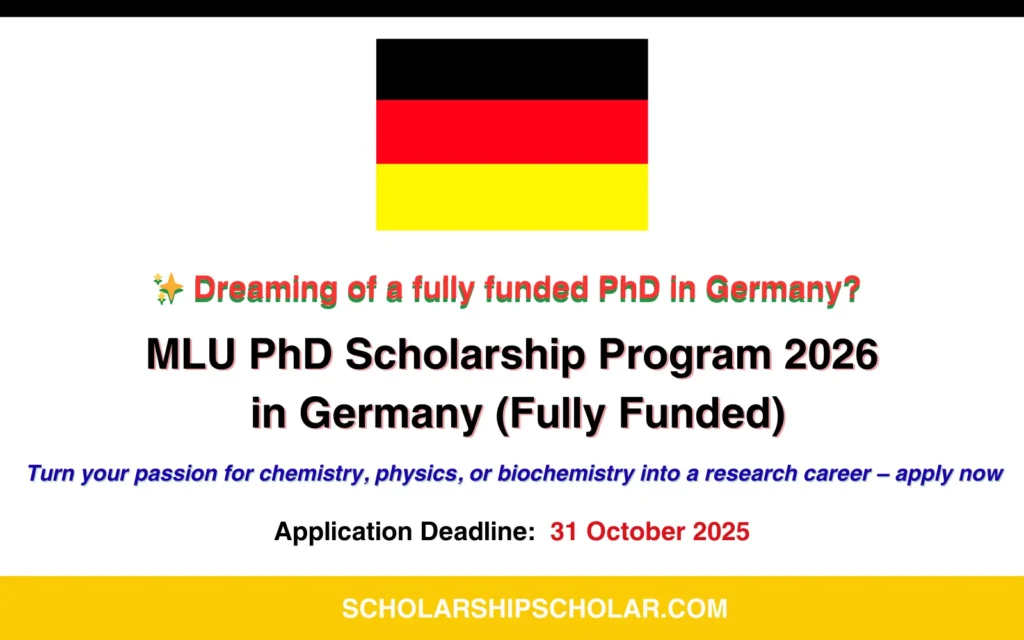Are you passionate about advancing science and exploring how complex molecular systems work?
If yes, then the MLU PhD Scholarship Program 2026 in Germany might be the perfect opportunity for you. This fully funded PhD program is offered by the Martin Luther University Halle-Wittenberg (MLU) under the prestigious Research Training Group RTG2670 “Beyond Amphiphilicity: Self-Organization of Soft Matter via Multiple Noncovalent Interactions.”
The program is designed to bring together international researchers to work on soft matter science. A rapidly evolving interdisciplinary field. From physical chemistry and spectroscopy to polymer synthesis, mathematics, and theoretical chemistry.
The PhD researchers will engage in projects that tackle some of the most exciting scientific challenges of today. With around 25 doctoral researchers, the program fosters a global network of innovation and collaboration.
If you are ready to expand your research career in one of Germany’s most respected universities, with the added benefit of international mobility to Switzerland and France. This scholarship is an opportunity you should not miss.
Read carefully before applying-

About MLU PhD Scholarship Program 2026
Founded in 1817 through the merger of two historic institutions (the University of Halle and the University of Wittenberg), MLU is the largest and oldest university in Saxony-Anhalt, Germany. It has a strong tradition of excellence in teaching and research, with an international academic community.
MLU offers both German and English-taught programs and provides a vibrant student life in the historic and affordable city of Halle. With world-class faculty, interdisciplinary projects, and a commitment to innovation, it stands out as a top choice for PhD research in Europe.
Quick Highlights –
| Name of the scholarship | Martin Luther University Halle-Wittenberg (MLU) PhD Scholarship Program 2026 |
| Host Country | Germany |
| Host University | Martin Luther University Halle-Wittenberg (MLU) |
| Degree Level | PhD |
| Program | RTG2670 “Beyond Amphiphilicity: Self-Organization of Soft Matter” |
| Scholarship Coverage | Fully Funded (Employment Contract) |
| Eligible Nationalities | All nationalities |
| No. of PhD Positions | 9 Fully Funded (approx. 25 researchers total) |
| Research Areas | Chemistry, Physics, Biochemistry, Mathematics, Theoretical Chemistry, Soft Matter Science |
| Application Deadline | 1 November 2025 |
Why Choose Martin Luther University Halle-Wittenberg for Your PhD?
- You will be part of an interdisciplinary and international research team, collaborating with experts from diverse fields.
- You will receive structured doctoral training that includes workshops, conferences, and seminars to strengthen your academic skills.
- You will gain mobility opportunities abroad through collaborations with partner institutions worldwide.
- You will have access to cutting-edge laboratories and research resources to support your work.
- You will live in a historic yet affordable German city with a vibrant student community and rich cultural life.
Eligibility Criteria of MLU PhD Scholarship Program
- To apply for the MLU PhD Scholarship Program 2026, applicants must meet the following requirements:
- Hold a Master’s degree, diploma, or an equivalent qualification in one of the following fields:
- Chemistry
- Physics
- Biochemistry
- Mathematics
- or related disciplines
- Show a strong interest in soft matter science and self-organization research, with a willingness to explore interdisciplinary approaches.
- Be highly motivated, innovative, and research-driven, with the ability to work independently and in teams.
- Demonstrate proficiency in English (both written and spoken) to successfully engage in academic and research activities.
- Applications are open to candidates of all nationalities, ensuring diversity and global participation.
Research Focus Areas
The program focuses on understanding molecular self-organization beyond amphiphilicity. Students will investigate:
- Noncovalent interactions in soft matter systems.
- Phase transitions and crystallization processes.
- Catalysis and nanoscale solvation.
- Molecular aggregation and structure formation.
- Predictive modeling and simulations for molecular self-assembly.
Also Read: High Point University Scholarships 2026 in USA (Funded)
Financial Benefits of MLU PhD Scholarship Program
Successful candidates of the MLU PhD Scholarship 2026 will receive the following benefits:
- Fully Funded Employment Contract with a secure income through university sponsorship.
- Annual financial support for research projects, seminars, and academic training.
- Opportunity to collaborate internationally with research partners in Zurich (Switzerland) and Paris (France).
- Personalized mentorship and training through workshops, structured seminars, and one-on-one guidance.
- Work alongside 11 internationally recognized scientists in an interdisciplinary setting.
- Access to an energetic, innovative, and supportive environment at MLU.
- Affordable and vibrant student life in Halle, with housing and living expenses significantly lower compared to other German cities.
Also Read: Sir James McNeill Postgraduate Research Scholarship 2025 in Australia (Funded)
Application Process
Here’s how to apply for the MLU PhD Scholarship Program 2026:
- Visit the official MLU scholarship page and select the PhD program.
- Prepare all required documents, including academic transcripts, CV, and a strong research motivation statement.
- Clearly highlight your research interests and explain how they align with soft matter science and the RTG2670 program.
- Submit your application before the deadline (1 November 2025).
- Early applications are encouraged since positions are filled on a rolling basis.
FAQs
Is the MLU PhD Scholarship 2026 fully funded?
Yes, it offers a fully funded university employment contract along with additional academic and research support.
What is the application deadline?
The last date to apply is 1 November 2025. Early applications are strongly recommended.
Do I need IELTS/TOEFL for this scholarship?
If English is not your first language, proof of proficiency is required. However, if your Master’s degree was taught in English, you may be exempt.
What kind of research projects are included?
Projects will cover soft matter science, including self-organization, catalysis, crystallization, nanoscale solvation, and molecular simulations.
Can international students apply?
Yes, students from all nationalities are eligible to apply.

